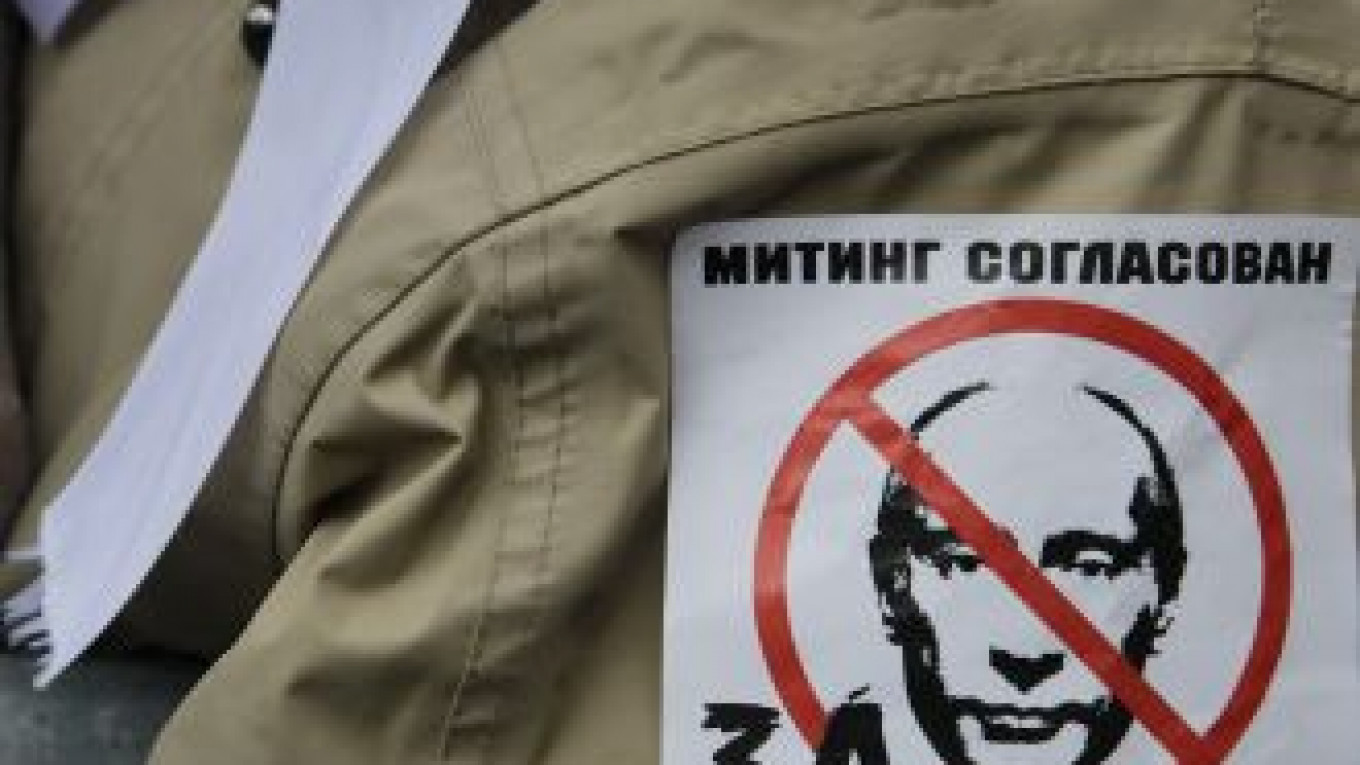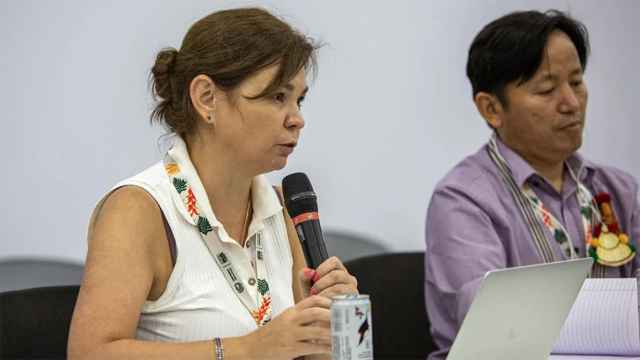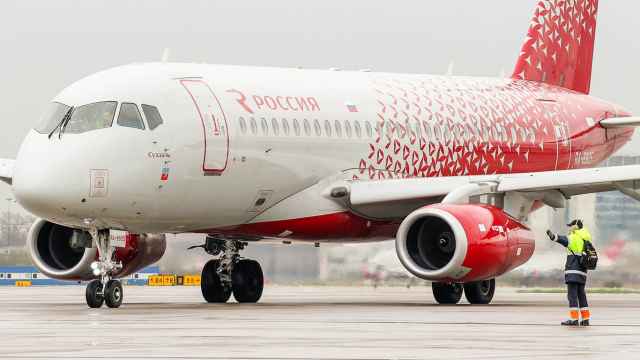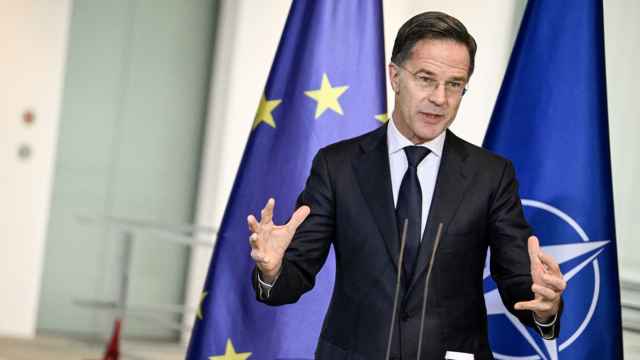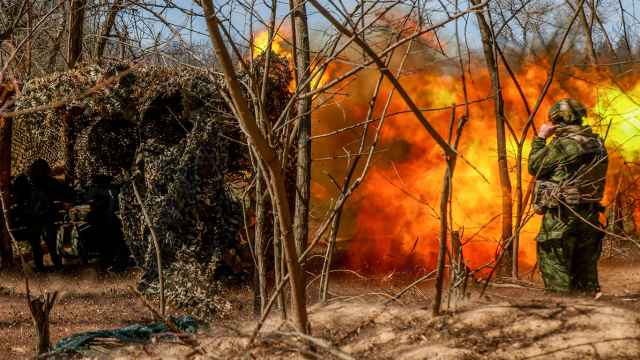The Kremlin's longtime political mastermind Vladislav Surkov was removed from his post Tuesday in what observers called a response to recent anti-government protests.
But in a show of force to balance the move, Prime Minister Vladimir Putin reiterated that the government has no plans to bow to the protesters' main demand and hold a repeat of the scandal-plagued Dec. 4 parliamentary elections.
Analysts said Surkov's ouster was likely part of Putin's plan to strengthen his position in the Kremlin, which he intends to occupy for a third time after the presidential election in March.
Surkov, who was first deputy chief of presidential staff since 1999, was moved to the government to become deputy prime minister overseeing economic modernization and innovation, the Kremlin reported on its web site Tuesday.
The rumor about his upcoming departure was first broken late last week by the Kremlin-connected socialite Ksenia Sobchak, who ironically was also a speaker at a mass anti-governmental rally at Moscow's Prospekt Akademika Sakharova on Saturday.
Surkov will be replaced in the Kremlin by Vyacheslav Volodin, a senior official in the United Russia party and a former chief of Putin's governmental staff.
"The decision about Surkov's departure was made, as far as I understand, by both Putin and Medvedev. It is a serious call to modernize the political system," former Finance Minister Alexei Kudrin told Kommersant FM radio on Tuesday.
Despite his ties to Putin, Kudrin was also a speaker at the Saturday rally, which attracted a crowd estimated between 45,000 and 80,000 people. Most were members of the middle class protesting alleged vote fraud at the State Duma elections, as well as the Kremlin's heavy-handed control over the country's politics — which Surkov is widely credited for installing.
Among Surkov's achievements are the creation of the ruling United Russia party and the pro-Kremlin youth group Nashi, as well as placing state television — the main source of information for the majority of population — under tight governmental control.
Even his critics recognize his skills as a spin doctor.
"He was able to achieve projects of a large scale," Mark Feigin, a political commentator and a member of the Solidarity opposition group, said by telephone Tuesday.
Surkov also enjoys an eccentric reputation, being known for keeping a photo of U.S. President Barack Obama in his office, having contributed lyrics for two records by rock star Vadim Samoilov and even penned a novel under an alias.
He also sat on a bilateral U.S.-Russian human rights commission along with Michael McFaul, who was confirmed earlier this month as the new U.S. envoy to Russia.
However, the system that Surkov built struggled through this electoral cycle, facing unprecedented resistance from the Internet-savvy middle class, as well as the public's general fatigue under the ruling establishment.
United Russia lost a constitutional majority in the Duma, and barely managed to keep a simple one. Vote monitors and opposition activists have accused it of heavily rigging the Dec. 4 vote.
Surkov has tried to avoid antagonizing the protesters, whom he described as "angry urban communities."
In a post-election interview to Izvestia, he acknowledged that society is demanding change and proposed creating a new party for the middle class. Ex-minister Kudrin has since been tipped as potential head for such party.
Notably, protesters on Prospekt Akademika Sakharova and an earlier rally on Bolotnaya Ploshchad have not targeted Surkov, focusing their wrath instead on Putin and head of the Central Elections Commission, Vladimir Churov.
Protest co-organizer Ilya Ponomaryov of A Just Russia actually listed Surkov among the group in the ruling establishment that realizes how serious the protest mood is, along with Kudrin and former Kremlin official and current Rosnano chief Anatoly Chubais.
But analysts told The Moscow Times that Surkov's move to the government was nevertheless a sacrifice to the protesters' calls for change and a demotion, though one with a cushy sinecure.
Political commentator Feigin said Surkov's political influence will likely fade with his new job, especially given the uncertain future of President Dmitry Medvedev. Putin and Medvedev plan to swap jobs after the presidential vote, but analysts have doubted that weak Medvedev would keep the post for long.
Feigin was echoed by independent political analyst Stanislav Belkovsky, who added that "it was a demotion that comes with a consolation prize." He was referring to the Skolkovo project, a Russian attempt to create a local version of the Silicon Valley that Surkov would now be supervising.
Belkovsky also noted that turf wars in the Kremlin played their part. Surkov's replacement Volodin is known to have coveted the job for years.
"By installing Volodin, Putin creates his own team to facilitate his return to the presidency," Feigin said.
Volodin's influence is boosted by his having overseen the creation of the All-Russia People's Front, a project to unite nonpolitical groups supporting Putin, who has distanced himself from the flagging United Russia party and is looking for a new power base.
Surkov's move is also part of a big reshuffle in the Kremlin. The previous chief of presidential staff, Sergei Naryshkin, became Duma speaker last week, giving up his seat to former Deputy Prime Minister Sergei Ivanov. Both are members of Putin's inner circle.
Surkov's removal is not the only concession to the protesters. Earlier, the Kremlin also launched a reform to ease draconian rules for the registration of political parties and presidential candidates, though it is set to only come into force after the presidential vote in March.
Meanwhile, Putin said Tuesday that the only way to achieve a repeat Duma election is through the courts, which are notoriously loyal to the Kremlin.
"If there are any violations, courts should look into them and make an objective decision on those questions," Putin said.
He also made a new verbal attack on protesters, saying they had no real goals and only rallied for the sake of rallying, Interfax reported.
Putin has earlier compared protesters to monkeys from Rudyard Kipling's "Mowgli" and the symbol of protests, the white ribbon, to condoms. This had fueled a fresh wave of indignation at last Saturday's rally.
Alexei Mukhin, head of the Center for Political Information, said Putin is playing coy by redirecting complaints to the judiciary, as he knows full well that protesters' lawsuits stand no chance in the courts.
"In the majority of cases the opposition lost" such lawsuits, Mukhin said by telephone.
A Message from The Moscow Times:
Dear readers,
We are facing unprecedented challenges. Russia's Prosecutor General's Office has designated The Moscow Times as an "undesirable" organization, criminalizing our work and putting our staff at risk of prosecution. This follows our earlier unjust labeling as a "foreign agent."
These actions are direct attempts to silence independent journalism in Russia. The authorities claim our work "discredits the decisions of the Russian leadership." We see things differently: we strive to provide accurate, unbiased reporting on Russia.
We, the journalists of The Moscow Times, refuse to be silenced. But to continue our work, we need your help.
Your support, no matter how small, makes a world of difference. If you can, please support us monthly starting from just $2. It's quick to set up, and every contribution makes a significant impact.
By supporting The Moscow Times, you're defending open, independent journalism in the face of repression. Thank you for standing with us.
Remind me later.


